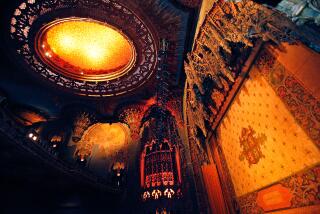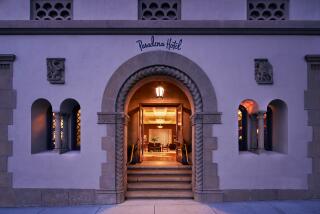The Algonquin, Site of the ‘Round Table’ Literary Salon, Sold
- Share via
NEW YORK — The Algonquin Hotel, legendary as a gathering place for writers and actors, has been sold for $29 million to a Brazilian hotel chain that promises to maintain its traditions, officials announced Thursday.
The world-famous hotel was acquired by San Paulo-based Caesar Park Hotels International, a subsidiary of Aoki Corp. of Tokyo.
“I am confident that the new owners will maintain the very special atmosphere that has made the Algonquin all that it is today,” said Ben Bodne, who with his wife, Mary, owned and operated the 200-room hotel for 41 years.
The hotel is best known as the home of the “Round Table,” a collection of writers and actors who regularly lunched at a large round table in its Oak Room. During the 1920s, the ranks of the Round Table included such personalities as Robert Benchley, Dorothy Parker, Robert Sherwood, Edna Ferber, George S. Kaufman and Alexander Wollcott.
Booth Tarkington, John Drew, the Barrymores, H. L. Mencken and Douglas Fairbanks Sr. were among those who liked to stay at the hotel.
“Throughout its 85-year history, the Algonquin has maintained a civilized atmosphere, reminiscent of a fine English inn,” Bodne said.
The new owner said it will continue to operate the hotel much as it has been, with an eye toward the exclusive end of the market.
“Medium-sized hotels, similar to the 200-room Algonquin, are most conducive to providing the highest standard of personalized service for the individual traveler,” Caesar Park President Chieko Aoki said in a statement.
Aoki said the company would follow a similar approach, improving and upgrading some areas without changing the basic character of the hotel.
“Acquisition of the Algonquin, with its colorful history and traditions, carries with it a special responsibility,” she said.
Aoki said the hotel’s architecture and history make it worthy of preservation.
The hotel, with its red brick and limestone facade, opened its doors in 1902 as the Puritan Hotel. The name was changed to the Algonquin by Frank Case, an employee who became the hotel’s operator from 1907 to 1946.
The sale was announced less than four months after Bodne said the hotel was not for sale.
“This is my home, I love it here--and it’s not for sale,” Bodne said in February. He specifically denied reports of a sale to a Brazilian company.
The Bodnes, who had honeymooned at the hotel, took over its operation following Case’s death. They said they would maintain their residence at the hotel and “play an important role in the life of the Algonquin.”
News of the sale came as a surprise to the New York City Landmarks Preservation Commission, which is seeking a protected status for the building that would prohibit its demolition.
The new general manager of the hotel, Andrew Noble, said he believed that the new owners would support landmark status. “I think it is very important, especially for a hotel,” he said.
Noble said the hotel enjoys a healthy 85% occupancy rate, higher than the city average of 72%. He said he saw no problems in keeping the occupancy rate high, and said the hotel would cater to the individual traveler, with emphasis on repeat business.
Caesar Park, formed in 1976, also owns hotels in Rio de Janeiro, Brazil, and at a park in southern Taiwan.
The purchase is the latest in a wave of buying of U.S. real estate by Japanese firms, including the sale of the Exxon building in mid-town Manhattan to Mitsui Fudosan for $610 million and the purchase of the Arco complex in Los Angeles for $620 million.
Real estate experts say that with the high value of the Japanese yen and the high returns available on U.S. real estate, Japanese firms will likely be the biggest foreign buyers of U.S. properties this year.
More to Read
Sign up for The Wild
We’ll help you find the best places to hike, bike and run, as well as the perfect silent spots for meditation and yoga.
You may occasionally receive promotional content from the Los Angeles Times.






